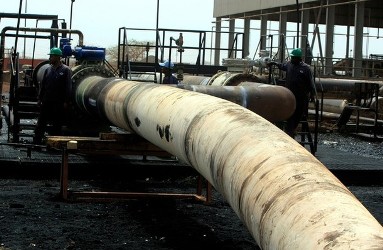Sudan lowers oil transportation fees demand
July 27, 2012 (KHARTOUM) — Khartoum negotiators in Addis Ababa announced Friday that Sudan lowered its demand on oil transportation fees to $32 stressing that no deal can be signed without the implementation of the security agreement.

Last Sunday chief negotiator, Pagan Amum, tabled South Sudan’s “last offer” saying Juba proposes US$9.10 and US$7.26 per barrel for its oil transported through the two Sudanese pipelines. He pointed out that they offer “a 7% increased processing fees”.
“We made a new offer to transport South Sudan’s oil at $21 instead of $25 and we ask $6 for transit fees, we also cancelled the marine terminal charges and reduced the processing fees. So we reduced our demand from $36 to $32”, Awad Abdel-Fatah, undersecretary of Sudan’s oil ministry, told reporters in Addis Ababa on Friday
For the oil produced by GNPOC, South Sudan offers $7.40 for the transportation, including the marine terminal fees, $1.07 for the processing facilities and $0.63 for the transit fee. Regarding the Petrodar oil Juba proposes $5.50 for the transportation and the marine terminal, $1.07 for the processing and $0.69 for the transit.
The Sudanese oil minister Awad al-Jaz last March already made the offer of $32 per barrel describing it as “fair”. It came two months after South Sudan’s decision to shut down its oil production after accusing Khartoum of confiscating over $800 million of its crude.
Abdel-Fatah pointed out that the Sudanese offer takes in consideration the new offer that Juba made which includes the $3.245 billion South Sudan pledged to cover a third of Sudan’s financial gap if Khartoum accepts its latest offer.
The Sudanese official further said they propose that Juba pays the fees in crude instead of cash, but he added that Juba refuses such arrangement.
Sudan which still subsidises fuel prices wants to benefit from its oil refineries in Port Sudan and Khartoum to cover the needs of local markets.
The UN Security Council held closed-door consultations last Wednesday on the progress of the talks and the looming deadline of 2 August fixed in resolution 2046.
Different sources say the Council members consider to extend the deadline if tangible progress is achieved by the two parties particularly in security matters.
Abdel-Fatah told reporters that the current Sudanese propositions might change according to the South Sudanese position.
He, however, warned that no deal can be enforced without an agreement over border security arrangements.
Sudan still refuses the inclusion by the African Union mediation of a region called “Mile 14” in the demilitarized zone the parties agreed to operationalise on the common border.
The mediators on the other side, do not want to follow Sudan on its demand and repeat that the lining of the buffer zone does not mean the demarcation of the disputed border between the two countries.
(ST)
